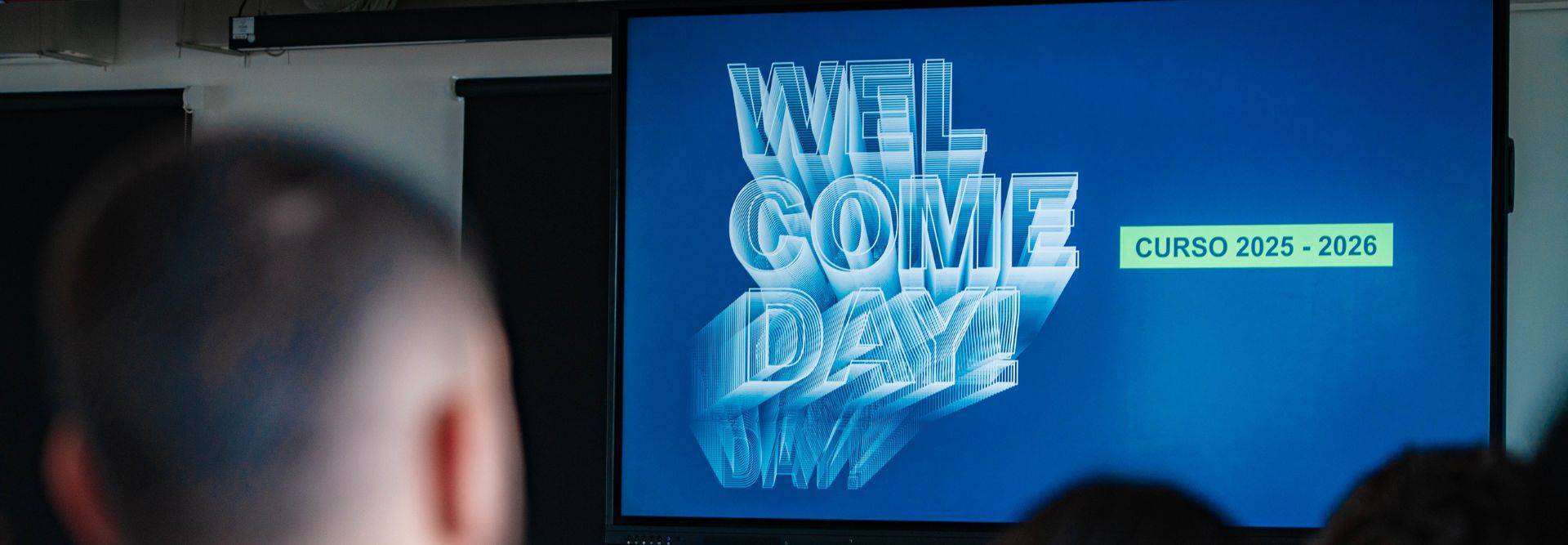UDIT's Higher Vocational Training Centre inaugurates the 2025/2026 academic year with a firm commitment to technology and employability
UDIT today kicked offa new academic year for its studentsof fourHigher Vocational Trainingqualifications, with a commitment to training that is connected to the reality of the labour market.
At the Welcome Day, Marina Almazán Grañeda, academic director of UDIT FP, welcomed the students of the four higher degree cycles that are joining this year and highlighted the relevance of vocational training today.
"As you know, the Vocational Training is currently experiencing a moment of great growth and social recognition. More and more companies are demanding specialised profiles that combine talent, creativity and technical skills, which makes VET a training pathway with high employability rates and with a strategic role in responding to the needs of the labour market," he said.
For his part, Héctor Alonso-Misol Gerlache, director of Vocational Training at UDIT, explained why the institution's offer in this area is different: "not all vocational training centres are the same. UDIT is the first to implement a project-based methodology. You are going to learn to work in a real environment, surrounded by professionals and to overcome the challenges you will encounter later on".
The event gave the new students a first-hand insight into what the next two years at the institution will be like and a first contact with the lecturers and classmates with whom they will be working and living with during this time.
In the 2025-2026 academic year, UDIT FPS will offer four degrees that will allow students to acquire the tools, approach and skills necessary to successfully join the technological and creative industries from day one.
Specifically, this year the following higher level training cycles will be offered
- Higher Degree in 3D Animation, Games and Interactive Environments: aimed at those who want to be part of the digital entertainment industry, interactive simulation or 3D visualisation. During the cycle, students learn to design characters, model scenarios and bring stories to life through advanced animation techniques.
- Higher Degree in Multiplatform Applications Development: responds to the growing need for digital solutions in all sectors and environments of the professional world. This degree trains students to work in the creation of front-end and back-end software, from the development of mobile apps to applications connected to cloud services, including the development of applications with integrated AI.
- Bachelor's Degree in Web Application Development:ensures that students acquire the necessary skills to conceive, develop and maintain web applications adapted to multiple devices, with an emphasis on user experience, security andmodern browser compatibility , offering a complete vision of UX/UI.
- Higher Degree in Administration of Networked Computer Systems: adegree focused on cybersecurity, it trains experts in the management, protection and maintenance of technological infrastructures. Students learn to implement secure networks, manage servers, secure virtualised environments and design contingency plans for computer threats.
The four degrees are taught at UDIT's Technology, Innovation and Applied Sciences Campus, a building of more than 7,000 square metres where creativity, technology and collaboration converge.
Equipped with state-of-the-art classrooms, the Campus has been designed to be a key meeting point for the technological and scientific community, so it also hosts hackathons, congresses and conferences. Located on one of Madrid's main thoroughfares, Calle Alcalá, it offers quick and easy access from anywhere in the city.
Vocational Training that goes beyond
UDIT's proposal at Formación Profesional stands out for offering a comprehensive educational model, based on a methodology based on real projects that allows students to face challenges that simulate different professional situations.
Student support is provided across the board throughout the entire training stage. A personalisedmentoring system allows each student to have a tutor who guides their academic development, guiding them towards their incorporation into the labour market and facilitating the search for opportunities that are aligned with their profile, interests and professional objectives.
On the other hand, their technical development is complemented with training in soft skills, essential for an increasingly demanding and collaborative work environment. Skills such as effective communication, resilience, critical thinking, time management and leadership are naturally integrated into the training projects.
The UDIT FP model also stands out for offering a natural progression towards the official university studies offered by the institution. Thanks to an optimised system of validations, FPS graduates can continue their training in university degrees in related areas, without losing their academic rhythm or disconnecting from their professional career.
In addition to this, the teaching staff is made up of active professionals, which guarantees a constantly updated training that is connected to the reality of the sector, as well as the possibility of obtaining official certifications issued by recognised entities, which reinforce the profile of the students with a view to their incorporation into the labour market.
With the start of the new academic year, UDIT reinforces its commitment to an educational offer designed to prepare solid professionals, with the ability to adapt and innovate in an increasingly competitive environment.

